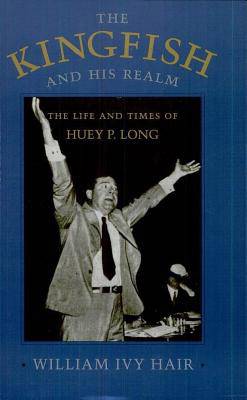
En raison d'une grêve chez bpost, votre commande pourrait être retardée. Vous avez besoin d’un livre rapidement ? Nos magasins vous accueillent à bras ouverts !
- Retrait gratuit dans votre magasin Club
- 7.000.000 titres dans notre catalogue
- Payer en toute sécurité
- Toujours un magasin près de chez vous
En raison de la grêve chez bpost, votre commande pourrait être retardée. Vous avez besoin d’un livre rapidement ? Nos magasins vous accueillent à bras ouverts !
- Retrait gratuit dans votre magasin Club
- 7.000.0000 titres dans notre catalogue
- Payer en toute sécurité
- Toujours un magasin près de chez vous
45,95 €
+ 91 points
Description
Born in rural Winn Parish, Louisiana, Huey P. Long grew up to become the most influential governor the state of Louisiana has ever known. Indeed, he commanded a power base that ultimately made him virtual dictator of his home state. The story of Long's remarkable life, from his turn-of-the-century upbringing to his death at the hands of an assassin in 1935, fascinates students of Louisiana politics still.
In The Kingfish and His Realm, William Ivy Hair carefully sets Long and his regime in the context of the history of Louisiana and the South. He provides both a new biography of Long and a thoroughgoing treatment of his social, political, and economic environment in light of the latest scholarship. The result is a view of Huey Long that dispels many of the myths that have surrounded him and also challenges T. Harry Williams' influential interpretation. Hair emphasizes Huey's darker side, portraying him as a gifted, charismatic leader who craved power above all else--the more of it the better. From childhood, Long believed that he could become president of the United States, and almost all of his actions were taken with that goal in mind. By the early 1930s, he thought the presidency was within reach. The book's detailed and convincing picture of Louisiana as an impoverished, underdeveloped state rife with complex social and class-based tensions goes far toward explaining how this ruthless, supremely energetic, power-hungry man was able to realize such grand political dreams at so young an age. When the forty-two-year-old Long was gunned down on September 8, 1935, it ended his drive for the White House but not his influence in Louisiana. Even today, more than half a century after his death, when political pundits no longer speak in terms of Longs and anti-Longs, Huey remains a larger-than-life icon in the state--and the most controversial character in its colorful history. The Kingfish and His Realm may not end the controversy, but it does significantly enrich our understanding of Huey Long and his world.Spécifications
Parties prenantes
- Auteur(s) :
- Editeur:
Contenu
- Nombre de pages :
- 440
- Langue:
- Anglais
- Collection :
Caractéristiques
- EAN:
- 9780807121245
- Date de parution :
- 01-01-97
- Format:
- Livre broché
- Format numérique:
- Trade paperback (VS)
- Dimensions :
- 154 mm x 229 mm
- Poids :
- 589 g

Les avis
Nous publions uniquement les avis qui respectent les conditions requises. Consultez nos conditions pour les avis.






